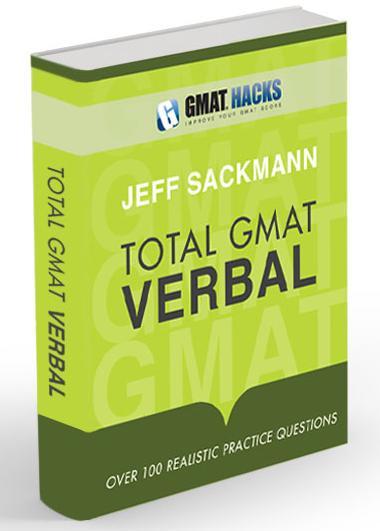
Bookshelf
|
|
Total GMAT Math Jeff's complete Quant guide, on sale now! |
|
|
Total GMAT Verbal Everything you need to ace GMAT Verbal! |
1,800 Practice Math Questions
Buy Jeff's books at Amazon.com

GMAT Official Guide, with IR
OG Math | OG Verbal
OG12 & Quant Rev solutions!
GMAT Question of the Day
Beginner's Guide to the GMAT
GMAT Hacks Affiliate Program

Recent Hacks

Categories
- General Study Tips
- Goals and Planning
- CAT Strategy
- The Mental Game
- GMAT Math Strategy
- GMAT Math Topics
- Mental Math
- Data Sufficiency
- Critical Reasoning
- Reading Comprehension
- Sentence Correction
- Analytical Writing Assessment
- Integrated Reasoning
- IR Explained
- Business School Admissions
- GMAT Prep Resources
- Practice Questions
- Total GMAT Math
- Total GMAT Verbal
- GMAT 111

Get the Most Out of GMAT Practice Questions
| You should follow me on Twitter. While you're at it, take a moment to subscribe to GMAT Hacks via RSS or Email. |
I often tell students that, if they master all of the GMAT Math questions in The Official Guide, they will do well on the test. Usually, I'm right. Sometimes, however, you can get so focused on learning those specific questions that you lose sight of the big picture.
Obviously, the questions you see in The Official Guide are not the same as the questions you'll see when you sit for the GMAT. They're close, and they cover nearly identical content, but they are not the same questions. Thus, you're not doing practice problems because you want to master practice problems. Instead, you're doing practice problems because you want to be able to handle other problems.
It's a subtle distinction, but a very important one. This isn't grade 8 algebra, where you do 50-question homework assignments with nothing but FOIL exercises, knowing that tomorrow's quiz will be 10 more FOIL exercises, formatted in the same way.
The difference in practice strategy is subtle, as well. Of course you still want to learn how to do the practice problems. But rather than focusing on the minutia of each individual question, never lose sight of the general strategies you're learning.
Ask yourself the following questions:
- What concepts are being tested here?
- Do I need to brush up on those concepts?
- What would happen if the numbers were different/bigger/smaller?
- What other answers could I find from the same information? (This is particularly relevant on geometry questions.)
- How would this question be phrased if it were Data Sufficiency instead of Problem Solving? (Or vice versa.)
- How else could the question give me enough information to solve the problem?
- How could the test-maker construct a question like this that is easier? harder?
There's a theme here: those questions are designed to get you inside the head of the people who create the exam. The more you can think like they do, the better you'll be able to anticipate the questions you see on the test. A more extreme strategy toward the same end is to write your own practice questions, based on Official Guide questions. I wrote about how to do that here.
Long story short: Train yourself to think flexibly. Each sample question is a represtative of a class of questions you might face on the test. You'll never be able to predict all 37 quantitative questions you see on the GMAT, but if you can anticipate 5 instead of 0, or 25 instead of 20, that's a huge step toward reaching your score goal.
About the author: Jeff Sackmann has written many GMAT preparation books, including the popular Total GMAT Math, Total GMAT Verbal, and GMAT 111. He has also created explanations for problems in The Official Guide, as well as 1,800 practice GMAT math questions.
 |
Total GMAT Verbal
The comprehensive guide to the GMAT Verbal section. Recognize, dissect, and master every question type
you'll face on the test. Everything you need, all in one place, including 100+ realistic practice questions. |